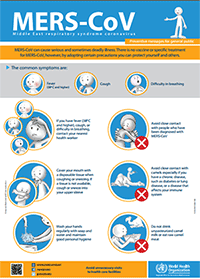Over 2 million Muslim pilgrims are expected to participate in this year’s hajj that begins next week in Saudi Arabia’s holy city of Mecca.
In preparation, the Saudi Ministry of Health with support from World Health Organization (WHO) has put in place measures to prevent and rapidly address any health issues that could arise during the hajj, including the Middle East respiratory syndrome coronavirus (MERS-CoV) and other respiratory diseases.
In addition, WHO has contributed to the training of more than 25 health cadres from the cities of Jeddah, Mecca and Madinah on rapid response to health emergencies. The training focused on outbreak investigation in the context of respiratory diseases such as MERS-CoV, as well as on control measures, risk communication, community engagement and data management. Participants improved their skills in infection prevention and control and in tracing the contacts of infected people to limit additional spread.
Prevention of sunstroke and heat exhaustion is a priority this year, as temperatures are expected to be high. The Ministry of Health has increased the number of hospital beds dedicated to heat stroke, and fans and water are being provided in the holy sites where pilgrims will be gathering.
The Ministry has also been implementing the “Together for a healthy pilgrimage” campaign to increase awareness on how to avoid heat exhaustion and sunstroke, as well as on personal hygiene and how to protect against food poisoning.
At air, sea and land points of entry to the country, public health measures have been taken to ensure pilgrims have been vaccinated against yellow fever, meningitis, polio and seasonal influenza.




